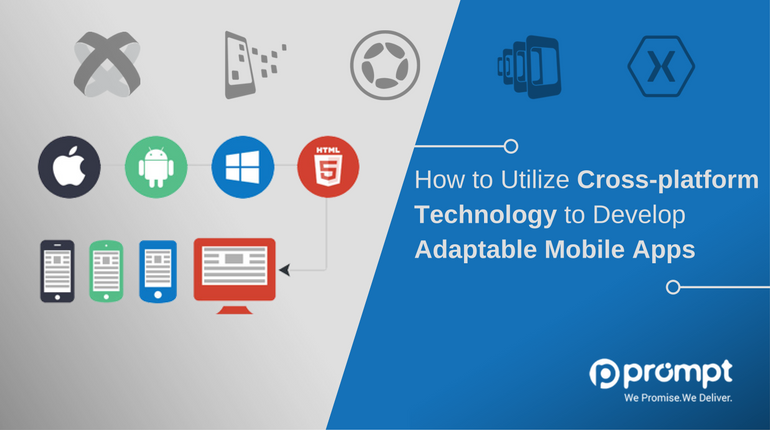Mobile application development industry has grown so swiftly that it has altered the way businesses function globally. With enterprises following mobile apps to boost their efficiency and innovativeness, mobile app developers have to work on numerous versions of an application for multiple platforms.
Once your plan and mobile app idea are ready, it’s the time to define your target audience and market. As soon as that is determined, it's time to choose a platform to make your app which suits your business approach, project and strategy.
However, targeting a mobile audience isn't always as straightforward as just building a mobile version of your website. As hiring developers who are expert in each mobile application development platform are very tough. Also, creating, updating and then maintaining different technology versions turns this job to be more complicated, costly and consumes more efforts as well as time. That's where cross-platform apps come into the picture. Cross-platform apps can run on multiple platforms without having disconnected versions.
How Cross-platform mobile apps more adaptable?
Cross-platform software solutions accumulate a single app source code into native code that will run on diverse operating systems. Cross-platform mobile apps are built using an intermediate language, and you can work with one source code.
This code can be shared transversely on the target platforms like across both Android and iOS. Cross-platform apps are dissimilar to HTML5 hybrid apps as hybrid apps usually add a mix of native app and mobile app perception.
Benefits of Cross-platform apps
The cross-platform route enables a developer to build one source code for an application, which the platform then transforms into the code for the given native environment which comprises of Android, Windows, iOS, and more.
There's a much more attached to a native app like presentation compared to a hybrid app. There is an immediate benefit to the developers as they can reuse the developed code that's previously been written, letting the platform manage the compiling process, relatively than having to write source codes from scratch. This makes the procedure swifter and cost-effective.
Also, when you use a cross-platform solution the deployment and release of updated versions of your app becomes simpler. Features like the use of extended plugins and dashboards keep the operations steady under one roof which makes life better for the development team. The other key benefit is that the User Interface (UI) is rendered utilizing ‘native' controls so that the performance can be as rapid as native.
Which of the cross-platform application technologies are precise for you?
Not all cross-platform solutions are same, so it's essential to explore the strong point of each, depending on the extent of integration you will require, what you are agreeable to invest, and who you will require to hire.
Your mobile developer will be able to assist you with the finest fit for your app's needs. Many developers are experts in one or more of the platforms as well as the different frameworks, so here's an overview of some of the most utilized cross-platform software tools.
- Xamarin
Xamarin is a cross-platform solution that enables developer's code in C# programming language with .NET framework, and then it compiles the code for the right native UI pertaining to iOS, Windows, macOS or Android apps. Xamarin supports the cloud model also.
Xamarin’s mobile lifecycle products are the finest which helps in delivering powerful solutions by offering higher quality apps.
- PhoneGap
PhoneGap is a feature-packed software tool that is used to build cross-platform native applications. When it is used along with different frameworks like Ionic or jQuery Mobile, it can be used to develop advanced apps having diverse functionalities swiftly. PhoneGap also supports Node.js and JavaScript-powered Backbone.js which usually most of the front-end developers know.
PhoneGap offers different options to develop mobile apps which include PhoneGap Build which is a cloud-based app building platform, PhoneGap Developer App which is a combined desktop app and mobile app unit and PhoneGap Enterprise which is an enterprise software platform for developing advanced and robust apps integrated with better marketing support functionalities. PhoneGap works on free as well as paid plans depending on the amount of data and its access to add plugins.
- Appcelerator Titanium
Titanium assists in developing cross-platform apps, utilizing high-powered user interface (UI) elements, Alloy MVC framework, and the cloud services.
It allows JavaScript-savvy developers to build robust back-end cloud services. It easily connects your app to your database without executing server-side coding. It uses functionalities that can add more swiftness to your apps.
- Corona SDK
Corona helps in building different cross-platform native applications related to Android, Nook, iOS, and Kindle. It has multiple plugins and APIs for adding highly advanced features to apps, like location services and transitions. It is useful for mobile game development.
Corona's Enterprise version offers added suppleness, customization, and personalization. It allows developers to widen the built-in APIs with custom native extensions.
- Apportable SDK
Apportable is software used for developing cross-platform native apps using Apple-based technologies. It offers added benefits like if you have a primarily built iOS mobile app and want to transform it into cross-platform; you have the choice to reuse your present active code for Android applications.
Moving forward
Prompt Softech has a specialist team of developers in native and cross-platform mobile application development. This means that you can hire our expert Android and iOS programmers who have mastered the art of application development. Our modernized and adaptable solutions make sure that you get in touch with your niche market.





No comments